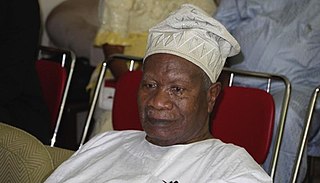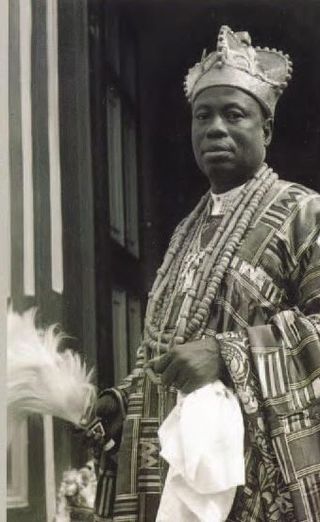Related Research Articles

Nnamdi Benjamin Azikiwe, PC, usually referred to as "Zik", was a Nigerian statesman and political leader who served as the third Governor-General of Nigeria and first president of Nigeria during the First Nigerian Republic which existed from 1963 to 1966. Considered a driving force behind the nation's independence, he came to be known as the "father of Nigerian nationalism".
Chief Obafemi Jeremiah Oyeniyi Awolowo was a Nigerian nationalist and statesman who played a key role in Nigeria's independence movement (1957-1960). Awolowo founded the Yoruba nationalist group Egbe Omo Oduduwa, and was the first Leader of Government Business and Minister of Local Government and Finance, and first Premier of the Western Region under Nigeria's parliamentary system, from 1952 to 1959. He was the official Leader of the Opposition in the federal parliament to the Balewa government from 1959 to 1963.
The Nigerian Youth Movement (NYM) was Nigeria's first genuine nationalist organization, founded in Lagos in 1934 at Stanley Orogun, with Professor Eyo Ita as the founding father and many others, including Samuel Akisanya. Ernest Ikoli, the first editor of the Daily Times of Nigeria, which was launched in the month of June 1926, was another founding member. Immediate concerns included the supposedly inferior status of Yaba College, appointments of Africans to senior positions in the civil service and discriminations against the African truck drivers. However, the Lagos-based organization at first, has generally moderate views and pledged to support and co-operate with the governor. The president was Dr Kofo Abayomi. Ernest Ikoli was vice president and H.O. Davies was the secretary. It was the first multi-ethnic organization in Nigeria and its programme was to foster political advancement of the country and enhance the socio-economic status of the Nigerian citizens. Adeyemo Alakija later became President of the NYM.
The National Council of Nigeria and the Cameroons (NCNC) later changed to the National Convention of Nigerian Citizens, was a Nigerian nationalist political party from 1944 to 1966, during the period leading up to independence and immediately following independence.
The Nigerian National Democratic Party (NNDP) was Nigeria's first political party.
Chief Samuel Ládòkè Akíntọ́lá otherwise known as S.L.A. was a Nigerian politician, aristocrat, orator, and lawyer. He was one of the founding fathers of modern Nigeria, he served as Oloye Aare Ona Kakanfo XIII of Yorubaland and served as premier of Western Nigeria from independence in 1960 till his assassination in 1966.
The Action Group (AG) was a Nigerian nationalist political party established in Ibadan on 21st March 1951, by Chief Obafemi Awolowo. The party was founded to serve as the platform for realizing his preliminary objective of mobilizing Western Nigerians to forestall the NCNC control of the Western Region and the subsequent aim of cooperating with other nationalist parties to win independence for Nigeria. It benefited immensely from the relationships developed in the Egbe Omo Oduduwa formed in Awolowo's days in London as a student.

Colonial Nigeria was ruled by the British Empire from the mid-nineteenth century until 1960 when Nigeria achieved independence. British influence in the region began with the prohibition of slave trade to British subjects in 1807. Britain annexed Lagos in 1861 and established the Oil River Protectorate in 1884. British influence in the Niger area increased gradually over the 19th century, but Britain did not effectively occupy the area until 1885. Other European powers acknowledged Britain's dominance over the area in the 1885 Berlin Conference.

The First Republic was the republican government of Nigeria between 1963 and 1966 governed by the first republican constitution. The country's government was based on a federal form of the Westminster system. The period between 1 October 1960, when the country gained its independence and 15 January 1966, when the first military coup d’état took place, is also generally referred to as the First Republic. The first Republic of Nigeria was ruled by different leaders representing their regions as premiers in a federation during this period. Leaders include Ahmadu Bello Northern Nigeria 1959–1966, Obafemi Awolowo Western Nigeria 1959–1960, Samuel Akintola Western Nigeria 1960–1966, Michael Okpara Eastern Nigeria 1960–1966, and Dennis Osadebay Mid-Western Nigeria 1964–1966.
Eyo Ita (1903–1972) was a Nigerian educationist and politician from Creek Town, in present-day Cross River State, who was the leader of the Eastern Government of Nigeria in 1951 and the first Professor Nigeria ever had. He was one of the earliest Nigerian students who studied in the United States instead of the frequent route of studying in the United Kingdom. He was a deputy national president of the National Council of Nigeria and the Cameroons (NCNC) in the late 1940s and early 1950s.

Chief Moses Adekoyejo Majekodunmi was a Nigerian gynaecologist and obstetrician. He was Minister of Health in the Nigerian First Republic.

Samuel Akisanya, was a Nigerian trade unionist and nationalist based in Lagos, Nigeria during the colonial era, one of the founders of the Nigerian Youth Movement. He was also the Oba of Isara, an office which he held from 1941 until his death. He is today widely regarded as the greatest king in the history of the city.
Kofoworola Adekunle "Kofo" Abayomi was a Nigerian ophthalmologist and politician. He was one of the founders of the nationalist Nigerian Youth Movement in 1934 and went on to have a distinguished public service career. His last major public assignment was as chairman of the Lagos Executive Development Board from 1958 until 1966.

Nigerian nationalism asserts that Nigerians as a nation should promote the cultural unity of Nigerians. Nigerian nationalism is territorial nationalism and emphasizes a cultural connection of the people to the land, particularly the Niger and the Benue Rivers. It first emerged in the 1920s under the influence of Herbert Macaulay, who is considered to be the founder of Nigerian nationalism. It was founded because of the belief in the necessity for the people living in the British colony of Nigeria of multiple backgrounds to unite as one people to be able to resist colonialism. The people of Nigeria came together as they recognized the discrepancies of British policy. "The problem of ethnic nationalism in Nigeria came with the advent of colonialism. This happened when disparate, autonomous, heterogeneous and sub-national groups were merged to form a nation. Again, the colonialists created structural imbalances within the nation in terms of socio-economic projects, social development and establishment of administrative centres. This imbalance deepened the antipathies between the various ethnic nationalities in Nigeria ." The Nigerian nationalists' goal of achieving an independent sovereign state of Nigeria was achieved in 1960 when Nigeria declared its independence and British colonial rule ended. Nigeria's government has sought to unify the various peoples and regions of Nigeria since the country's independence in 1960.

Chief Theophilus Owolabi Shobowale Benson, S.A.N. was a Nigerian lawyer who became one of the most prominent Yoruba politicians in the period leading up to Nigerian independence in 1960. He served as the Minister of Information, Broadcasting and Culture in the first post-independence government. Benson was imprisoned for several months after the first military coup of 1966. He returned to practice as a barrister, and was recognised as a prominent Yoruba chief.

Oba Sir Musendiku Buraimoh Adeniji Adele II, KBE was the Oba (King) of Lagos from 1 October 1949 to 12 July 1964.

A by-election was held for the Lagos seat in the Legislative Council of Nigeria in 1940. It followed the death of incumbent Olayinka Alakija, who had been a member of the Nigerian Youth Movement (NYM). Jibril Martin of the NYM was elected with 64% of the vote.

A by-election was held for the Lagos seat in the Legislative Council of Nigeria on 5 March 1941. It was required after the incumbent member Kofo Abayomi of the Nigerian Youth Movement (NYM) resigned in order to move to the United Kingdom to take up a Rhodes Scholarship in ophthalmology. Although Ernest Ikoli of the NYM was elected with 56% of the vote, the controversy caused by the election led to the eventual demise of the party.
Abubakar Ibiyinka Olorun-Nimbe (1908–1975) was a Nigerian medical doctor and politician who was the first and only Mayor of Lagos. He represented Lagos in the Legislative Council.
Separatist movements of Nigeria want to achieve state secession, which is the withdrawal of one or more of the states of Nigieria from the multinational state of the Federal Republic of Nigeria. The only act of secession in Nigeria occurred from 1967 to 1970 during the Nigerian Civil War, when the breakaway republic of Biafra declared its independence from Nigeria and was eventually defeated. Ever since then, Nigeria has experienced the emergence of separatist movements seeking the independence of Biafra as well as other proposed states.
References
- ↑ Awo: The Autobiography of Chief Obafemi Awolowo. Cambridge University Press, 1960.
- ↑ Toyin Falola, The History of Nigeria, Greenwood Press (30 September 1999). ISBN 0-313-30682-6
- ↑ Igomu Onoja (August 2005). "The Political Economy of News Reportage and Presentation of News in Nigeria: A Study of Television News" (PDF). University of Jos. Archived from the original (PDF) on 2011-08-15. Retrieved 2011-05-16.
- ↑ Austin Uganwa "NIGERIA FOURTH REPUBLIC NATIONAL ASSEMBLY" 2014.
- ↑ Awo: The Autobiography of Chief Obafemi Awolowo. Cambridge University Press, 1960. pp. 130-160.
- ↑ Al-Bashir, "Documenting Electoral Disputes", Vanguard, Nigeria, 7 August 2003.
- ↑ Tekena N Tamuno (1966) Nigeria and Elective Representation 1923−1947, Heinemann, p127
- ↑ Toyin Falola and Raphael Chijioke Igbo in the Atlantic World: African Origins and Diasporic Destinations, Indiana University Press, Page 273